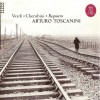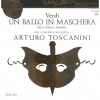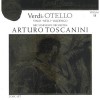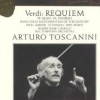| Voice/Instrument: |
Biography
Herva Nelli (January 9, 1909 – May 31, 1994) was an Italian-born operatic soprano.
Named after the French socialist Gustave Hervé, she was born in Florence, where she attended a convent school. At the age of twelve, however, she and her family left Italy for Pittsburgh, where she later studied at the Pittsburgh Music Institute.
In 1937, the soprano made her operatic debut with Brooklyn's Salmaggi Opera, as Santuzza in Mascagni's Cavalleria rusticana. In ensuing seasons, she gained experience with that ensemble, presenting roles that would form the core of her repertoire, including Leonora in Verdi's La forza del destino (with Sydney Rayner as Don Alvaro) and another Leonora in Verdi's Il trovatore. She also sang the title roles of Bellini's Norma, Verdi's Aïda and Ponchielli's La Gioconda. In 1947, she made her New York City Opera debut, as Santuzza, conducted by Julius Rudel.
Also in 1947, Nelli successfully auditioned for the conductor Arturo Toscanini (following the recommendation of Licia Albanese), and sang the part of Desdemona in the NBC Symphony Orchestra's concert presentation of Verdi's Otello, opposite Ramón Vinay. This led to the famous series of broadcasts of other Verdi works, which were later published as recordings by RCA: Aïda (1949, which was televised as well), Mrs Alice Ford in Falstaff (with Giuseppe Valdengo, 1950), the Requiem (with Giuseppe di Stefano, 1951), and Amelia in Un ballo in maschera (with Jan Peerce, 1954), which were the Maestro's final operatic performances. When Toscanini died three years later, he left his protégée his bâton in his Will.
In 1948, Nelli sang in Genoa (La Gioconda, conducted by Tullio Serafin) and at the Teatro alla Scala. At the latter theatre, she participated in the Boito Memorial Concert (excerpts from Mefistofele and Nerone, conducted by Toscanini) and starred in eight performances of Aïda (with Elena Nicolai as Amneris).
From 1949, the glamorous dramatic soprano performed with the New Orleans Opera Association: Aïda (with the young Norman Treigle as the King of Egypt), Otello (1954), Aïda again (1955), and Il trovatore (with Leonard Warren, 1958). She was also often heard in Philadelphia (from 1950 to 1958), in Aïda, Il trovatore, Norma, Otello, La forza del destino, Puccini's Tosca (conducted by Eugene Ormandy) and La Gioconda. In 1951, Nelli reappeared with the New York City Opera, in Cavalleria rusticana again, as well as Aïda; the next year, she portrayed Maddalena de Coigny in Umberto Giordano's Andrea Chénier. With the San Francisco Opera, in 1951 and 1952, the soprano sang in Otello, La forza del destino (with Robert Weede), Aïda (with Mario del Monaco), Cavalleria rusticana, Il trovatore, and La bohème (this last on tour to Los Angeles); in 1957, she returned for Un ballo in maschera. With the Baltimore Civic Opera in 1952, she debuted as Aïda; in the 1954-55 season, she sang there in Il trovatore.
In 1953, Nelli debuted at the Metropolitan Opera, with which she appeared until 1961. She was seen in Aïda (conducted by Renato Cellini), La forza del destino, Il trovatore, Cavalleria rusticana, Andrea Chénier, Un ballo in maschera (with Marian Anderson, conducted by Dimitri Mitropoulos) and Mozart's Don Giovanni (as Donna Anna, her only Mozart assumption). With the Met, she toured to Boston, Philadelphia, Cleveland, Atlanta, Dallas, Toronto and Minneapolis.
Herva Nelli was also heard at the Cincinnati Opera many times between 1953 and 1956: Aïda, La traviata (as Violetta Valéry, opposite John Alexander, and conducted by Anton Coppola), Andrea Chénier, Un ballo in maschera and Puccini's Madama Butterfly (as Cio-Cio-San, conducted by Nicola Rescigno). The soprano was also seen with the Pittsburgh Opera (Un ballo in maschera, 1955), San Francisco's Cosmopolitan Opera (Il trovatore, 1956), Hollywood Bowl (the American premiere of Darius Milhaud's David, 1956), Lyric Theater of Chicago (Il trovatore, with Jussi Björling and Ettore Bastianini, 1956), Tulsa Opera (Aïda, 1956) and Opera Guild of Miami (Un ballo in maschera, with Richard Tucker, 1959). Upon her 1951 return to the City Opera, Howard Taubman wrote of her in The New York Times: "Mme Nelli's voice is of grand size and range, and when she has it under control it has quality and character. Her pianissimo singing can be lovely, indeed. But she has a tendency to force and drive her tone until it loses its natural beauty."
Among the orchestras with which she sang the Verdi Requiem were the New York Philharmonic (conducted by Guido Cantelli, 1955) and the New Orleans Philharmonic-Symphony Orchestra (1955). The prima donna toured to Colombia, Puerto Rico, Cuba, Mexico and Madeira.
Nelli gave her farewell in 1962, with the Brooklyn Opera Company, at the Academy of Music, in Norma. In retirement, she acquired a particular reputation as a chef. In 1985, she appeared in an interview in the documentary "Toscanini: The Maestro," which was telecast over PBS in 1988.
On May 31, 1994, the soprano succumbed to leukemia at the age of eighty-five, at the Sharon Country Manor, in Connecticut[1].
In 2005, reviewing the DVD release of the Concert Version of Aïda, Ira Siff, in Opera News, noted that "there is a sense of occasion here, as the eighty-two-year-old Toscanini … unleases a performance of immense power. Herva Nelli may not possess a voice of distinctive beauty, but she is committed to the drama and lives every moment through the music. Both of Aïda's big arias are handled with care and conviction, the 'O patria mia' particularly nuanced and convincing. Yes, one could wish for a longer, more dolce high C, but her reading of the aria is mesmerizing…."





